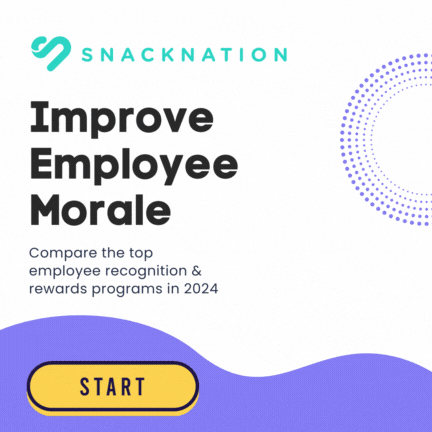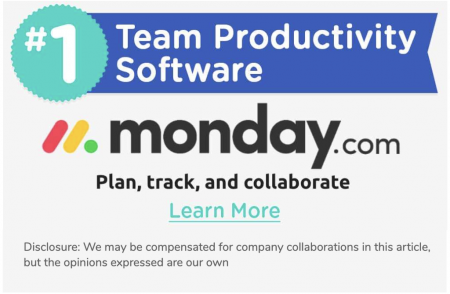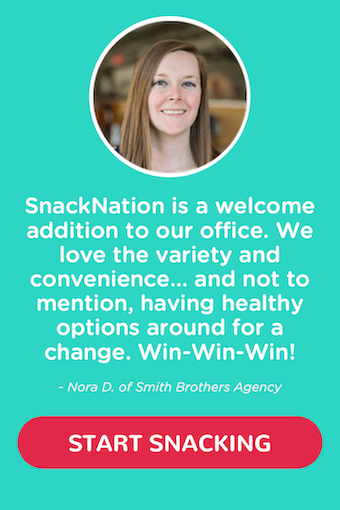A life without fear is impossible. The key is to be courageous by confronting fear with action. Paralysis may be this crisis’s greatest danger.
We live in an age of fear.
If you didn’t believe that before, I’m guessing you do now. The Coronavirus is bringing some of our most deep-seated fears to the surface: fear for the health and safety of ourselves and our loved ones, fear of an economic recession, fear of uncertainty and the unknown.
I am not immune to this fear either. I lead a team based out of Los Angeles and Chicago (with a few remote folks as well), and the health and safety of my team, our partners, and our Members is always my top priority. (“Health above all else” is our first core value for a reason!)
On top of that, SnackNation is a Workplace Experience Services company. We serve thousands of Member offices in all 50 states. Suddenly, entire companies are being asked to work remotely. Some of my friends and fellow business leaders have even asked if I’m worried that the workplace will somehow become less relevant in the future.
The truth is that I am fearful.
I experience fear every day – some related to COVID-19, most not. But that doesn’t mean I’m worried.
Worry, in my opinion, is fear without action. Or fear over things I can’t control.
And fear alone isn’t the problem. Doing nothing in the face of fear is the real danger.
You can respond to fear in one of two ways: you can let it paralyze you, or you can act courageously despite your fear.
The fears surrounding COVID-19 are no different, and this is what inspires me and gives me hope. Because we can control how we react in the face of fear, and that means we have agency to lead ourselves out of this crisis.
The last thing we need right now is for people to be paralyzed. We cannot have people thinking that doing nothing is the path to self-preservation or the right thing to do. This is rarely the case, if ever. I believe paralysis and inaction are actually the top ways we can prolong this crisis.
What we need is people confronting reality with courage, proactivity, and a mindset of progress and improvement.
Like I said before, I experience fear every day, but I do my best to address my fears with direct action.
For instance, sometimes I fear that my wife will get in a car accident… and when I do, I call her and let her know that I love her.
As a company, it can be frightening to roll out a new product to our Members…what if the product isn’t received as well as we intended? To combat this, we constantly speak with our Members, iterate on our products and services based on their feedback, and try to improve every day.
With Coronavirus I fear that we’ll lose business as a result of our Members and customers experiencing negative impact… so we’re speaking to our Members and asking “how can we help you during this challenging time?” and assessing if there is another opportunity to provide value that we haven’t previously recognized. (This is how we learned that Work-from-Home Wellness & Snack Boxes can be a great tool for companies that want to boost the morale, energy, and health of their teams while working remotely.)
And with this all being said, I don’t mean to minimize the seriousness of the health risks presented by COVID-19. Fear is certainly warranted. The virus is a real threat, and taking reasonable precautions is the right thing to do.
But paralyzing fear can make a bad situation exponentially worse. In addition to the public health risks, people and companies are experiencing real economic pain, much of which is caused by panic and inaction.
Again, this doesn’t mean that we ignore reality. It means we confront it, approaching our fears with conviction, confidence, and most of all, action. It means we limit our news consumption and refrain from obsessively watching the stock market (especially if we’re not going to do anything about it). It means we focus on self-care, while also caring for those around us. It means instead of sitting back, we act.
So what should we do? I believe all leaders and managers must:
- See and confront reality. This is key – we must see the world the way it is, not how we want it to be. This may mean making tough calls (like postponing events, implementing a hiring freeze, etc), but it can also lead you down the path of innovation and transformation for the long-term.
- Encourage calm, confidence, and optimism. Resilience makes the difference in any crisis, and resilience is formed on a foundation of informed calm. Your demeanor will impact those around you, so focus on your own confidence to rise to the occasion.
- Focus on creation, not consumption. This specifically applies to news consumption. In a news and information environment like ours, you can get so easily distracted and disheartened chasing the latest headlines. That’s why you must limit these inputs, and focus instead on your own activity. Watch the news intentionally and during limited windows (and at your own peril).
- Take care of yourself and encourage your team to do the same. As leaders, your team will take their cues from your words and action. Commit to self-care – eat and sleep well, maintain your workouts, and continue morning and evening routines that emphasize courage, gratitude, and healthfulness.
- Minimize wasted effort and low-value activity. You will always have limited time and bandwidth during a crisis. Deprioritize the efforts that don’t add much value (e.g., writing “perfect” emails, responding to stuff that will get taken care of on its own, attending low-priority meetings or getting in long-winded conversations about the state of the economy) so you can focus on higher leverage activities. It’s also during times of crisis that we must act quickly and decisively regarding the most important issues of the day. Declutter your brain and to-do list so you can think as clearly and act as decisively as possible.
- Focus on those around you. Life and business are not transactional, how you act now will matter massively in the future. See this as an opportunity to show up for your team, customers, and loved ones in the best way possible. It will pay exponential dividends in the long run. And that’s what life is – a long game.
Our collective response to this crisis and our ability to keep fear at bay will determine how fast we recover. In practice, this will mean adjusting to our new circumstances and finding new ways to remain productive. Necessity is the mother of invention, and the problems posed by Coronavirus will inspire new solutions – solutions that will live on, long past the point when Coronavirus is a distant memory.
One key for affected companies to remain productive is to maintain a sense of normalcy and continuity by re-creating amenities and culture even while employees are remote. This might mean keeping your weekly team meeting or daily stand-up via video conference. It might also mean translating your monthly all-hands into an email digest or shareable slide presentation. Perhaps it means converting your weekly catered lunch into a snack/food-delivery credit.
This is also why we just launched SnackNation Work-from-Home Wellness Boxes. We listened to our Members and customers, who are struggling to maintain a sense of business-as-usual while their entire team might be working remotely for the first time.
These specially curated boxes can be shipped directly to employee homes, and signal to your team that while their location may have changed, your level of care and dedication to their success has not. Productivity at home is just as important as it is in the office, and nutrition probably isn’t something that employees have accounted for as they transition to remote work for the first time. Not to mention, what a cool way to show the families of your employees that you care and that we’re all in this together.
If there’s one thing I can leave you with, it’s this: There’s no doubt that we are in a heightened state of fear and uncertainty. But fear is not our biggest threat, inaction is. It is up to us to meet this fear with informed, decisive action. If we do that, we can emerge from this crisis stronger, more unified, and more prepared to overcome the next crisis that comes our way.







